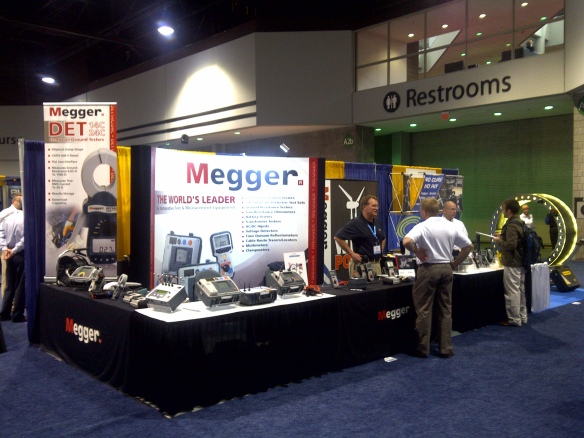The largest power engineering event in Mexico, the 2013 IEEE Mexico chapter conference is scheduled for July 7th through July 13th in Acapulco, Mexico.

Applications engineers Matz Ohlen and Nils Eng Wäcklen from Megger Sweden and Dr. Diego Robalino from Megger US will be making two presentations during the conference.
Presentation Abstract:
A NEW TECHNIQUE FOR DYNAMIC RESISTANCE MEASUREMENTS ON-LOAD TAP CHANGERS
The transformer is a critical substation asset that should operate reliably and safely. Based on studies and surveys done by power industry operators, most transformer failures start because of accessory failures such as bushings and tap changers. Like transformer testing, it is equally important to diagnose and test external or internal accessories for any fault or malfunction before it is too late.
Dynamic Resistance Measurement (DRM) has been used for circuit-breaker diagnostics for about 30 years. It is an interesting technique that can also be used to verify the switching operation of load tap changers (LTC). DRM, together with static winding resistance measurements per tap, can be a valuable method to validate the LTC operation and diagnose its condition.
Existing methods and techniques for dynamic measurements on load tap-changers are based on measuring current and/or voltage on the primary side of the transformer and short-circuiting the secondary side to minimize the inductance in the circuit. Static resistance measurements per tap are performed in a separate test sequence with the secondary side open.
A new technique (patent pending) involves combining current measurement with voltage measurements on both primary and secondary sides of the transformer. Then, the tester uses the transformer parameters to calculate inductive and resistive voltages to be able to calculate the dynamic resistance during a tap change. The new technique does not need a short-circuited primary side to reduce the inductance, and static and dynamic resistance can be measured in the same sequence thus saving total test time.
The presentation will focus on the DRM application and how it can be used for tap-changer diagnostics. Measurements have been performed on both non-mounted tap-changers (no-oil condition) and after being mounted inside a transformer (with oil). Different test setups have also been evaluated, including the new technique. The results from the tests will be presented and discussed.
Presentation Abstract:
TRANSFORMER ADVANCED DIAGNOSTICS TECHNIQUES BY FREQUENCY RESPONSE
Frequency response techniques (developed to better understand the overall condition of power transformers) were introduced more than 20 years ago. Scientists, researchers and utility operators have shown great interest in the development and application of frequency response techniques and, as a result, several documents have been published summarizing the research work and field tests all over the world. Frequency response techniques are practical non-intrusive and non-destructive diagnostic methods that allow investigation and help uncover solutions to problems that were once only suspected by other testing techniques. Good understanding of the fundamentals and objectives of each technique are paramount for manufacturers, operators and researchers.
Dielectric Frequency Response (DFR) also known as Frequency Domain Spectroscopy (FDS) is an advanced application of the well-known dissipation factor (tand) insulation test. The difference is the wide frequency “spectrum” used to evaluate the condition of the insulation system, along with being able to discriminate between the moisture concentration in the solid insulation versus the contamination of the liquid insulation. DFR provides several benefits to the industry, not only as a diagnostics technique but also as a quality assurance and quality control tool. DFR has evolved, and, simultaneously, the instrumentation utilized in the field has evolved parallel to overcome the field challenges such as: testing time constraints and the effect of electromagnetic noise in the substations.
Sweep Frequency Response Analysis (SFRA) is an advanced diagnostic technique based on measurements of the frequency dependency of the electrical responses (transfer functions) of transformer windings to low voltage applied signals. The primary objective of the SFRA technique is to detect winding deformation via changes to capacitance or inductance distributions. The sensitivity of the instrumentation and the accuracy of results are of extreme importance for end-users, and a thorough but simple guideline to evaluate the condition of the instrumentation and the correctness of connections and grounding must be discussed. Moreover, validation of results considering reinforcing conclusions with results from other electrical testing techniques have been included to support field decision making.
It is critical for the technical community to gather valuable information during testing using DFR and SFRA techniques. Users recognize that major transformer failures and/or catastrophic failures may be prevented if the fundamentals, execution and interpretation of these techniques are well known and implemented. Throughout this presentation, authors will discuss main objectives, fundamentals, best testing practices and interpretation of results of the frequency response methods developed for advanced condition assessment of power transformers.
Working with distributor Oropeza Ingenerios, Megger will showcase the latest in power testing equipment software enhancements and handheld instruments. Megger application engineers in the areas of substation maintenance and protection will be at the exhibition to answer any questions.
To schedule an appointment during this event please contact Washington Cabrera at 1-800-723-2861, extension 7382.



